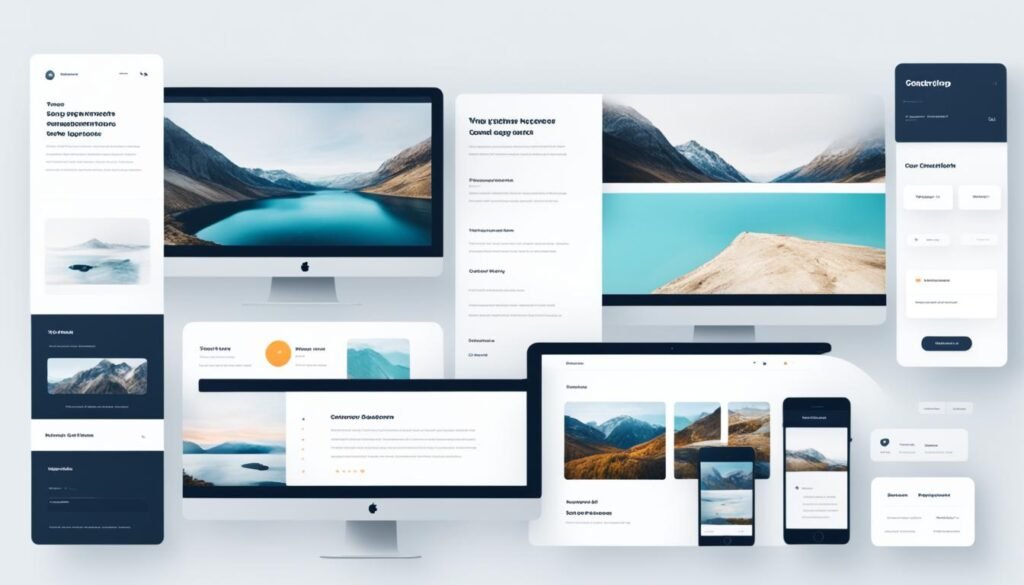In today’s digital era, effective website design plays a pivotal role in establishing your online presence. It goes beyond mere aesthetics; quality web development directly influences user engagement and retention. In the competitive UK market, a well-crafted website is not just a luxury but a necessity for building your brand identity. As potential customers increasingly rely on digital platforms for services and products, investing in impactful website design can significantly enhance your conversion rates and grow your business.
Table of Contents
ToggleKey Takeaways
- Website design is essential for an effective online presence.
- Quality web development enhances user engagement.
- A well-designed website boosts conversion rates.
- It is crucial for brand identity in the UK market.
- Investing in website design is a key aspect of digital strategy.
Understanding the Basics of Website Design
Website design encompasses the planning and creation of websites, combining both aesthetics and functionality. It involves various visual elements such as layout, colours, fonts, and images. These components play a critical role in shaping the overall user experience (UX). Users interact with a website based on its design, which makes understanding what is website design essential for creating an effective platform that not only looks good but is also easy to navigate.
What is Website Design?
At its core, website design refers to the process of crafting websites that appeal to users visually while ensuring optimal usability. A well-designed site integrates various visual elements to promote engagement. The importance of website design lies in its ability to capture attention quickly, as users often form opinions within seconds of landing on a page.
Importance of Website Design in Digital Strategy
An effective website design is a cornerstone of any digital strategy. It not only influences your brand image but also establishes credibility, which is essential for building user trust. Good design can lead to enhanced conversion rates and a positive impression. Research indicates that users tend to exhibit a greater sense of trust towards websites that are aesthetically pleasing and functionally robust.
Key Principles of User Experience (UX)
Understanding the key principles of user experience (UX) is essential for effective website design. Focusing on the user journey enables you to create a seamless path that guides users from their initial visit to desired actions, such as making a purchase or signing up for a newsletter. Clear user flow enhances engagement and ultimately improves conversions.
Designing for User Journey
Mapping out the user journey involves identifying the stages users go through when interacting with your site. This detailed understanding supports effective UX design, allowing you to incorporate elements that meet user needs at every stage. By prioritising the user flow, you ensure that visitors receive timely information, reducing friction and enhancing satisfaction during their experience.
The Role of Intuitive Navigation
Intuitive navigation plays a critical role in enhancing website usability. Users should find relevant information quickly, without encountering confusion or frustration. A well-structured navigation system streamlines pathways through your content, significantly impacting user experience (UX). Proper placement and design of navigation links can lower bounce rates and encourage users to explore more of your site, leading to greater engagement.
Responsive Design: Adapting to Every Device
In today’s digital landscape, having mobile-friendly websites is essential as more users access the web through various devices. This necessity highlights the importance of responsive design, which ensures that your website remains functional and visually appealing across different screen sizes. By providing optimal viewing experiences, responsive design greatly enhances user satisfaction and engagement.
The Need for Mobile-Friendly Websites
Shifting user habits have made mobile-friendly websites a priority for online businesses. With a significant percentage of web traffic now coming from mobile devices, sites must adapt to ensure device compatibility. A well-designed responsive website not only improves user experience but can also positively influence your search rankings. Google’s mobile-friendly test indicates that page responsiveness is a crucial factor in determining search visibility.
Tools for Testing Responsiveness
To maintain exceptional website performance, regularly testing responsiveness is vital. A variety of responsive design tools are available, simplifying this process. Popular options include BrowserStack and Google’s Mobile-Friendly Test, which let you assess how your site operates across multiple devices. Consistent testing allows you to identify and resolve issues, ensuring that your website continues to perform well for all users.
| Tool Name | Description | Key Features |
|---|---|---|
| BrowserStack | Cross-browser testing tool for various devices | Live testing, screenshots, automated tests |
| Google’s Mobile-Friendly Test | Assess mobile usability of your website | Instant results, issues highlighted, mobile usability scores |
| Responsive Design Checker | Check how websites appear on different screen sizes | Customizable parameters, user-friendly interface |
| Screenfly | View and test your website on various devices | Multiple device options, simple to use |
Integrating User Interface (UI) for Effective Interaction
Integrating effective user interface (UI) design is crucial for fostering user engagement on your website. The incorporation of well-designed UI components enhances the overall user experience by facilitating seamless interactions with various interactive elements such as buttons, forms, and images.
UI Components That Enhance User Engagement
Choose UI components that are not only visually appealing but also contribute to improved user engagement. For instance, buttons should reflect your branding while offering clear calls to action. Forms must be intuitive and straightforward, encouraging users to complete tasks easily. Thoughtfully designed interactive elements guide users through their journey and make navigation a pleasant experience, ultimately increasing the likelihood of return visits.
Consistency in Design Elements
Maintaining consistency in design is vital for reinforcing your brand identity. Uniformity in colours, fonts, and layout creates a cohesive user interface (UI) that enhances usability and promotes familiarity. Users can navigate your site more effortlessly when design elements are consistent, thus improving their overall experience. This attention to detail not only helps in branding but also supports user retention, as visitors are more likely to engage with a site that feels familiar and well-organised.

Website Design and Search Engine Optimization (SEO)
The relationship between effective website design and search engine optimisation (SEO) is essential to enhance your online presence. Optimising your design choices plays a significant role in improving search rankings. Key design elements such as loading speed, mobile compatibility, and user interaction contribute to overall SEO performance. Focusing on these aspects ensures a positive user experience, which search engines favour when determining site visibility.
The Relationship between Design and SEO
A well-executed design not only attracts users but also meets critical SEO best practices. Consider the following factors when assessing how design and SEO intertwine:
- Loading speed: Websites that load quickly tend to rank higher.
- User engagement: High engagement levels can signal quality to search engines.
- Mobile-friendliness: Responsive designs enhance usability on various devices.
Integrating these elements effectively results in improved search visibility, benefiting both user experience and search rankings. When users find what they need effortlessly, they are more likely to stay on your site longer, further bolstering its SEO performance.
Optimising Pages for Better Search Visibility
To advance your website optimisation strategies, you should consider optimising pages by employing various SEO best practices that enhance search visibility. Key tactics to implement include:
- Conducting keyword research: Identify relevant keywords to target within your content.
- Utilising meta tags: Ensure your titles and descriptions are succinct and keyword-rich.
- Employing headers: Use proper headers to create a clear content hierarchy.
- Image optimisation: Use descriptive alt text for images to improve visibility.
A structured website that features an organised layout enhances crawlability for search engines. Prioritising both design and SEO means you take steps to become prominent in search rankings, leading to increased traffic and engagement.
| Design Element | Impact on SEO | Best Practice |
|---|---|---|
| Loading Speed | Higher rankings | Minimise image sizes and scripts |
| Mobile-Friendliness | Improved user retention | Use responsive design techniques |
| User Engagement | Positive ranking signals | Ensure high-quality, relevant content |
Choosing the Right Content Management System (CMS)
Selecting the appropriate content management system (CMS) is vital for efficient website management. A well-chosen CMS streamlines your content updates, making it easier to focus on your site’s growth. Several popular CMS options exist, each offering distinct features tailored to various website design options and requirements.
Popular CMS Options for Website Design
Among the most widely used content management systems are:
- WordPress – Known for its user-friendly interface, WordPress powers a significant portion of websites globally.
- Joomla – Offers more complex functionalities, suitable for sites requiring extensive features and structure.
- Magento – Ideal for eCommerce platforms, providing robust tools for online store management.
Benefits of Using a CMS for Your Website
Utilising a CMS presents numerous advantages, significantly enhancing your website’s performance and maintenance. Key benefits include:
- User-friendly interfaces that simplify content updates.
- Robust support communities that assist users with common challenges.
- The ability to scale your website effortlessly as your business grows.

By embracing a content management system, you can transform how you handle website management. This choice can lead to improved efficiency, allowing for a more streamlined approach to maintaining your site while enjoying the extensive benefits of CMS.
| CMS | User-Friendliness | Best For | Notable Features |
|---|---|---|---|
| WordPress | High | Blogs, Small to Medium Websites | Themes, Plugins, SEO Tools |
| Joomla | Medium | Complex Websites | Flexibility, Multi-User Support |
| Magento | Medium | E-commerce | Product Management, Payment Gateway Integration |
The Importance of Web Accessibility
Web accessibility plays a crucial role in ensuring that all individuals, regardless of their abilities or disabilities, can effectively interact with your website. By incorporating inclusive design principles, you not only cater to a broader audience but also significantly enhance the overall user experience. As more people rely on the internet, designing websites that everyone can use becomes essential.
Designing for All Users
Creating a website with web accessibility in mind involves adhering to accessibility guidelines such as the Web Content Accessibility Guidelines (WCAG). These standards help you identify areas where your site can improve, fostering an environment that welcomes all users. Adopting an inclusive design approach ensures that different needs are met, including those of individuals with visual, auditory, or mobility impairments.
Ultimately, prioritising web accessibility demonstrates a commitment to social responsibility, increasing engagement levels. Failing to accommodate users with disabilities not only limits your audience but can also detract from the user experience for everyone. A more accessible website results in higher customer satisfaction and loyalty.
Conclusion
In summary, website design is a multifaceted discipline that significantly influences user experience, engagement, and search engine rankings. As you explore the various elements of effective design, it’s crucial to integrate principles of user interface (UI), user experience (UX), and accessibility into your projects. This understanding will enhance the overall quality of your site and ensure that it serves the needs of all users.
Moreover, staying informed about emerging trends in web development insights is essential. As technology evolves, so too do user expectations and preferences. You must continuously update your skills and approaches to website design to maintain a competitive edge in the ever-changing UK market.
By embracing these factors, you can create a robust online presence that not only captures the essence of your brand but also aligns with future trends in web development. Your commitment to these principles will ultimately lead to greater success in engaging users and improving visibility in search rankings.





